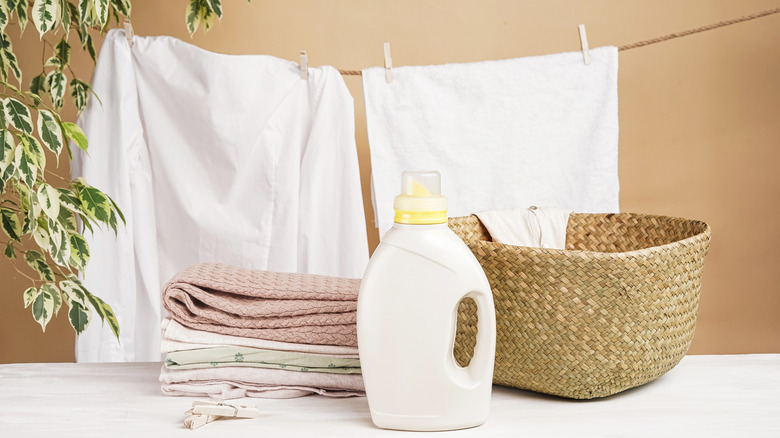Cutting Back on Detergent Waste: Sustainable Laundry Practices
Every time you do your laundry, you’re not only cleaning your clothes but also contributing to detergent waste, which can significantly impact the environment. Traditional laundry detergents often come in large, single-use plastic containers, and many people use more detergent than necessary, leading to waste.
Cutting back on detergent waste is not only eco-friendly but can also save you money and reduce the risk of skin irritations caused by detergent residue on your clothes. In this blog post, we’ll explore sustainable laundry practices to help you minimize detergent waste.
1. Measure the Right Amount
One of the most common reasons for detergent waste is using more detergent than needed. Many people simply pour detergent into the cap or dispenser without measuring. To avoid this, read the detergent’s instructions on the packaging and use the recommended amount for your load size. In most cases, you’ll find that you need far less detergent than you initially thought.
2. Switch to Concentrated Detergents
Concentrated detergents are a great way to reduce waste. They come in smaller packaging and require less detergent per load. Concentrated detergents are just as effective at cleaning your clothes, and they are an eco-friendly choice since they lead to less plastic waste.
3. Invest in Eco-Friendly Detergent Options
Consider switching to eco-friendly and biodegradable detergents. These options are not only better for the environment but are often designed to be more concentrated, so you can use less detergent per load. They also tend to have fewer harsh chemicals that can harm your health and the environment.
4. Use Cold Water
Washing your clothes with cold water instead of hot or warm water can help you use less detergent and save energy. Many modern detergents are formulated to work well in cold water, so your clothes can get clean without the need for extra detergent or higher water temperatures.
5. Pre-treat Stains
Instead of using more detergent to tackle stubborn stains, consider pre-treating them before tossing your clothes in the washing machine. Natural stain removers like baking soda, white vinegar, or hydrogen peroxide can be used. Pre-treating stains helps reduce the need for additional detergent and is more environmentally friendly.
6. Opt for Refillable Containers
Some brands offer refillable detergent containers, allowing you to reduce plastic waste by reusing the same bottle. When you run out of detergent, you can purchase refill pouches or bulk detergent to refill the container, eliminating the need to buy a new plastic bottle each time.
7. Avoid Overfilling the Machine
Overloading your washing machine can lead to less effective cleaning and the need for more detergent. Ensure you follow your machine’s recommended load size, allowing enough space for your clothes to move freely. This will ensure your detergent is used efficiently and reduce the risk of detergent waste.
8. Maintain Your Washing Machine
A well-maintained washing machine operates more efficiently and effectively, reducing the need for extra detergent. Clean the machine’s drum, lint filter, and detergent dispenser regularly to prevent buildup that can affect performance.
9. Choose an Energy-Efficient Washer
Investing in an energy-efficient washing machine can help you reduce water and energy consumption. These machines are often designed to use less water and detergent while still delivering excellent cleaning results.
10. Reuse Greywater
If local regulations allow, consider reusing greywater from your laundry for other purposes, such as watering your garden. This helps conserve water and makes the most of the detergent you’ve used.
11. Understand Water Hardness
Water hardness refers to the concentration of dissolved minerals in your water, particularly calcium and magnesium. If you live in an area with hard water, like many places in Utah, detergents don’t lather well, leading you to use more and create waste. A practical solution is to install a water softener. In Utah, numerous reliable suppliers offer various water softeners, which can effectively reduce water hardness, making your detergent more effective and thus limiting waste.
12. Regularly Check for Detergent Residue
Detergent residue can build up in your washing machine, leading to more frequent use of detergent. Ensure your machine is free from detergent buildup, and if necessary, run a hot water cycle with vinegar or citric acid to clean the drum and eliminate residue.
13. Repurpose Empty Detergent Containers
Instead of discarding empty detergent containers, consider repurposing them for storage or DIY projects. This can extend the useful life of the container and reduce waste.
By implementing these sustainable laundry practices, you can significantly reduce detergent waste, lower your environmental footprint, and save money.
Cutting back on detergent waste benefits the planet and ensures that your clothes come out clean and fresh without the need for excessive detergent. It’s a win-win situation that supports both eco-conscious living and your budget.
So, the next time you do your laundry, remember these tips to minimize detergent waste and contribute to a greener, cleaner world.

Shahid Maqsood, an MBA and Master in Mass Communications, is a seasoned writer with over a decade of experience. Specializing in news and celebrity coverage, he brings a unique perspective from his love for hunting and camping. His work spans multiple platforms like dosttrusty.com and newsbreak.com,Quellpress.com , airriflehunting, and bruitly.com showcasing his versatility and depth. Shahid’s insightful articles reflect his expertise, authoritativeness, and trustworthiness, making him a respected and reliable voice in digital content creation. His contributions engage and inform readers, embodying professionalism and passion in every piece.








One Comment